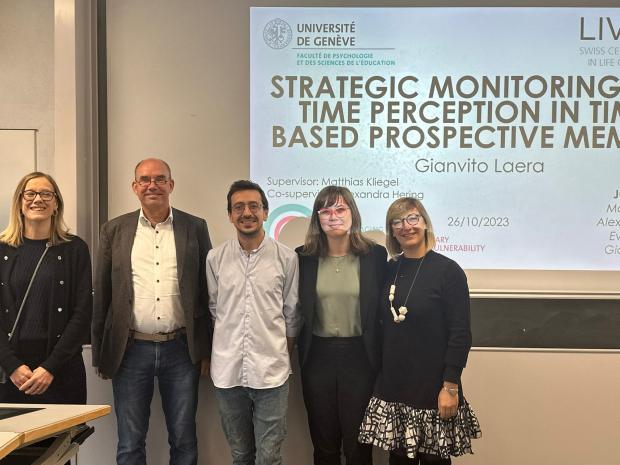
On Thursday 26 October 2023, Gianvito Laera defended his thesis entitled "Strategic Monitoring and Time Perception in Time-based Prospective Memory" under the supervision of Prof. Matthias Kliegel. After defending his thesis, the University of Geneva awarded him the degree of Doctor in Psychology. Congratulations to him!
Time-based prospective memory is the ability to fulfill an intention at the appropriate future moment, such as meeting a friend at 7:00 p.m., or taking the medication at dinner. Dr Laera's results comprehensively suggest that the involvement of time estimation is facilitated with longer PM tasks and can compensate age differences during these tasks (perhaps involving also learning processes), and when time monitoring is affected by consequences related to money losses. The present work provides an updated account of the literature, new insights, and data from two experimental studies investigating the cognitive and motivational mechanisms of time monitoring, as well as a quantitative account of the age effects through a meta-analysis.
Time-based prospective memory is a complex cognitive function that can be influenced by a myriad of factors, including individual and contextual characteristics. Although in the last 30 years there has been a growing research interest in the literature, the neurocognitive processes underlying time-based prospective memory are still a matter of debate. Specifically, there is limited knowledge about how time perception affects strategic monitoring of the external time, which is essential to perform time-based prospective memory tasks on time. Indeed, research generally assumes reliable connections between time perception and strategic time monitoring, but such assumption has been investigated systematically not very often.
To fill this research gap, Dr Laera's thesis offers a better understanding of the cognitive processes behind strategic time monitoring and time-based prospective memory, as well as to elucidate the state of the art concerning age effects and related cognitive processes in time monitoring and time-based prospective memory, and to investigate the potential modulation of the cognitive processes involved in time monitoring and time-based prospective memory that is driven by motivational incentives. Three main research questions were formulated:
- How do participants monitor the target time in time-based prospective memory tasks? Do participants actively use internal timing processes?
- What are the age-related differences in time monitoring assessed in the laboratory setting? How do specific task-related factors affect age-related differences in time-based prospective memory?
- How do monetary costs affect time monitoring and time-based prospective memory, as well as their relationship? Do people change time monitoring strategy?
Dr Laera's thesis is available online in open access on the Archives Ouvertes website.

